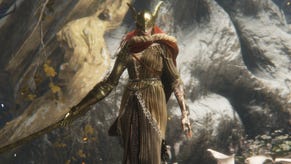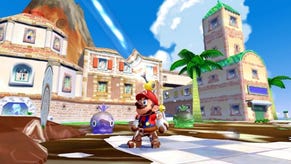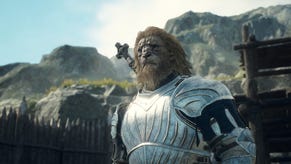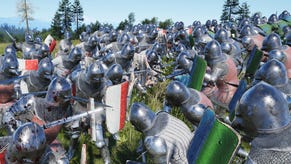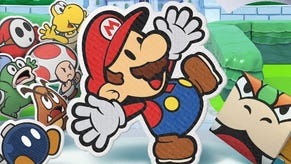GDC: Satoru Iwata keynote text commentary
Read what happened from top to bottom.
On Thursday 23rd March, Satoru Iwata delivered his keynote address, entitled "Disrupting Development", at the Game Developers Conference in San Jose. This page was updated live as we received information from our men on the ground. Read from top to bottom for itemised commentary. AND NOW I CAN SIT DOWN.
18.30: Good evening! Tonight's funcast is all going up on GamesIndustry.biz too, so the more obsessive of you can have fun comparing the texts if you like (I've been told not to talk about ducks after last time). Will Iwata announce the proper name for Revolution? Will he talk about Mario? Will I be able to effectively manage both content management systems simultaneously or am I about to say "ZOMG" to serious men in suits? Hit refresh for updates.
18.31: The start of the keynote has been delayed slightly. It'll get going in a minute. (Bit anticlimactic for a first update, this, isn't it?)
18.47: Jamil Moledina on stage to introduce Iwata.
18.48: Iwata takes to the stage. At this point he's talking a little about history - "Company A" usurping "Company B" in the 1990s - apparently it was a comment on Coke and Pepsi and bottled water, but obviously also a comment on Nintendo using the handheld market to regroup and reconsider its strategy while Sony got going with PlayStation. Apparently the "story about Pepsi demonstrates how thinking differently and holding strongly to your strategy can disrupt an entire industry in a good way".
18.51: As is tradition, Iwata begins an address discussing Nintendo's current situation - the success of Nintendo DS, Nintendogs, etc. "New kinds of software creating brand new players".
18.53: Iwata is now talking about Brain Training, and says he will discuss where the idea came from. (Diet Lilt?) "It came from where all great ideas come from - from our board of directors." [Laughter] [Forgiving crowd perhaps].
18.55: Iwata says he put together a task force to make a product whose appeal would include everyone from children to seniors - some of the taskforce had little experience of development. They settled on the Brain Training idea because of the popularity of books along those lines in Japan at the time - Nintendo CFO Mori-san was a big fan of them, he says.
18.58: Continuing on the subject of Brain Training, Iwata says that Dr Kawashima (who wrote the book) only agreed to meet with Iwata for one hour - on the day when the DS launched in Japan. Kawashima hooked a guy from the Nintendo team up to a monitor and showed that the prototype game was affecting blood flow in the brain - Iwata says this was "a very important moment".
19:01: Technology like handwriting was developed without any real idea what it would be used for - and ended up being perfect for Brain Training, Iwata says. He made a team of nine and gave them 90 to make the first game - "I could see they weren't happy, but with such a short schedule they had no time to complain."
19:03: Iwata is now demonstrating Brain Age - the US version of the first game. GOD I NEED A DRINK.
19:07: Iwata talks about how they have added a Sudoku mode to Brain Age in the West - a previously announced detail - with over 100 puzzles, and of course handwriting recognition.
19:09: Jamil Moledina (GDC), Geoff Keighley (G4TV) and Will Wright are now on stage playing Brain Age with one another.
19:14: Nintendo forced retailers in Japan to play the game in this way to convince them to order it in (with Will Wright?!), says Iwata. 70,000 were ordered - higher than expected, but not satisfactory for Iwata. When they came back with the second game, 850,000 were ordered. Now 5 million have been sold across the range in Japan. There are two simple rules to making great games - first, listen to your board of directors; second listen to the CFO. More laughter.
19:16: And he's giving a free copy of Brain Age to everyone in the audience. (That'll be my reward then.)
19:17: Iwata moves on to the subject of Wi-Fi Connection. Nintendo has been experimenting with networks since the 80s, he says, but never felt the time was right for a network game until the advent of DS. The development timetable for WFC was based on Mario Kart DS and Animal Crossing: Wild World - Nintendo wanted both games online.
19:19: "Online gaming normally belongs to the most aggressive players, and they can be a very vocal group. This interaction can be intimidating for casual players."
19:20: Nintendo didn't want to just appeal to those in the vocal hardcore, Iwata says. Instead they wanted to achieve a friendly atmosphere where you invite your friends to play. Apparently WFC was originally known as "Project Houseparty".
19:22: It's important to give players freedom to choose to play with strangers or with their own friends. Iwata wanted to avoid situations where someone entered a game and cut down all his trees in Animal Crossing!
19:23: WFC has grown much faster than Xbox Live, Iwata says, with over one million users since launch. It took Xbox Live 20 months to reach that level, he points out.
19:24: Iwata is now demonstrating a Wi-Fi game of Metroid Prime: Hunters (out now in the US) with four players.
19:25: Our correspondent reports that the units on-stage are all DS development units, and that there's no sign of the Revolution or mock-up hardware. Is he really going to do what it looks like he's doing? (After TGS, we're still guessing that's a 'no'. But argh.)
19:30: Hunters shows that Nintendo is not turning its back on traditional game styles, Iwata argues - as do games like Tetris DS (out now US) and New Super Mario Bros. (summer).
19:31: Aha. A 3D Zelda game on the DS - 2D perspective, but 3D graphics, loads of touch-screen controls. It's called "Zelda: Phantom Hourglass". It'll launch later this year and will be playable at E3 alongside Twilight Princess (Cube).
19:31: Iwata turns to Revolution. "Why are people comfortable picking up a TV remote, but not a game controller?" Revolution needed to be wireless, approachable, sophisticated, and "revolutionary", he says.
19:36: The design process involved lots of game designers - Miyamoto had the one-handed controller idea, while Metroid developers objected so the nunchucka were added, and two-handed controls were acknowledged as necessary for backwards compatibility.
19:37: "Some people put their money on the screen; we decided to put ours on the game interface" - although producing the controller will be expensive, he says.
19:38: "New is good, but there is also an appetite for old" - for kids, classic games are new, for adults they're a way to relive old experiences, Iwata says. So Sega Mega Drive games will be available through Virtual Console, and this applies to Hudson software as well.
19:40: Iwata talks about cost as a barrier to entry. $50/60 games require big teams, licenses, massive marketing cost. Thus, it's "understandable that publishers rely on sequels", "our industry is starting to look like a bookstore where you can only buy expensive encyclopedia sets". Iwata contests that if Tetris was presented now, developers would be told to get more levels, better graphics and a movie licence.
19:42: Future Zeldas, Marios and Metroids will be bigger masterpieces than ever before - but this doesn't have to be the only business model, he says. Virtual Console is the videogames version of iTunes Music Store. Others will offer such a service, but it won't be the same.
19:43: "When I imagine what faces us right now, I think of explorers setting foot on a new continent. For them, it was impossible to imagine what adventure lay ahead." Nintendo disrupted handheld, and it worked; Nintendo disrupted Wi-Fi, and it worked. Nintendo is disrupting the definition of a game, and it's working too, he says. In a few weeks (gasp!), you'll see how Nintendo plans to disrupt console gaming. Presumably a reference to E3.
19:45: Iwata leaves the stage.
This text commentary was beamed via men-with-keyboards live from San Jose where Satoru Iwata delivered his keynote comments. Holy wows! A full write-up of events will follow the keynote.
